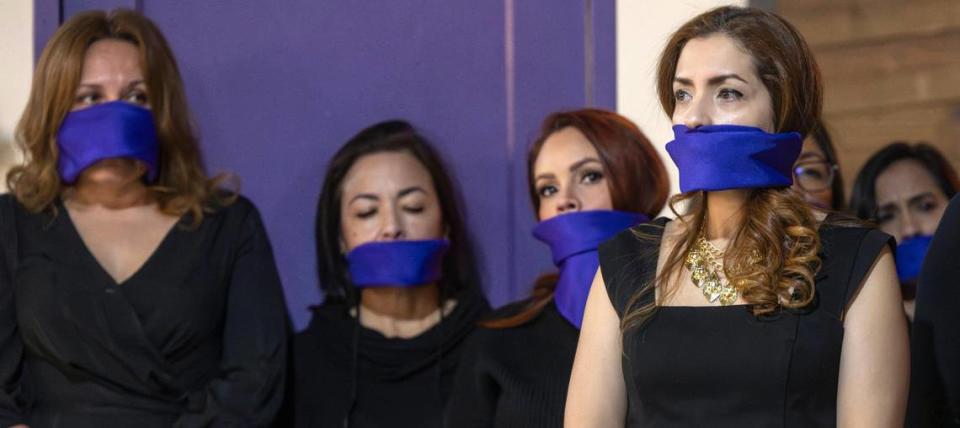‘We want us alive’: Is it time to make the murder of women in NC a unique crime?
- Oops!Something went wrong.Please try again later.
- Oops!Something went wrong.Please try again later.
Black and white portraits of women lined the walls inside the auditorium of El Centro Hispano on Friday morning.
Mauricio Concha Pérez spoke solemnly in Spanish about his sister Liliana, who was remembered in one of those portraits as a victim of femicide, someone killed by a former male partner.
“Two months ago, I did not know I would be about to go on a journey to an unknown and heartbreaking world, full of solitude, confusion and sadness,” said Concha Pérez.
Liliana Concha Pérez, 55, a Colombian-American and Durham real estate agent, was found dead in an office on Jan. 9. A man her family said was her former boyfriend was found dead of a self-inflicted gunshot with her, media outlets reported.
For International Women’s Day, the Triangle nonprofit El Centro Hispano assembled a crowd of over 100, with a female majority, to call on Gov. Roy Cooper and Attorney General Josh Stein to classify femicide as an offense separate from homicide.
This would make the killing of women in North Carolina a specific criminal offense with more severe sentences.
Concha Pérez recalled instances of the emotional abuse his sister Liliana endured from her boyfriend before she was killed. He emphasized that women must be aware of potential warning signs of abuse from their romantic partners.
Onstage, more portraits of deceased women of diverse races and ethnicities were set up with purple candles and cempasúchil flowers, the kind used to honor departed loved ones during El Día de los Muertos, The Day of the Dead.
Among the victims were Hadeel Hikmat of Apex, Cristina Matos of Raleigh, Nabaruna Karakumar of Apex, all allegedly killed by men close to them in recent years. Guadalupe Carreño, who was fatally shot less than three weeks ago in Raleigh, was also part of the altar.
“We want us alive”
An online petition urging state leaders to pursue classifying femicide as a crime was shared during the event, which featured Democratic state Reps. Sarah Crawford and Maria Cervania, and Chapel Hill Police Chief Celisa Lehew in attendance.
“We want us alive,” said Pilar Rocha-Goldberg, the executive director of El Centro Hispano, who knew Liliana Concha Pérez.
“Femicide ... is the most severe and extreme manifestation of the continued attacks on women and girls, because of gender roles, inequity between men and women, discrimination and the existence of harmful social norms,” Rocha-Goldberg said.
Other speakers included a survivor of domestic violence and local crisis workers who said they need more support to provide bilingual services to victims.
Cristina España, the deputy director for diversity, equity and inclusion in Cooper’s office, made a plea toward the audience in tears.
“This is painful, esto duele, (this hurts),” she said in a bilingual speech. “We just want to be alive.”
“Look around you,” she said, gesturing toward the portraits. “I’m going to embrace the pain. I’m not going to be silent.
What is femicide?
According to the World Health Organization, femicide, or feminicide, involves the “intentional murder of women because they are women,” with broader definitions including any killing of women or girls, especially by men who are close to them.
El Centro Hispano has tracked 51 homicide cases involving women in North Carolina linked to a male spouse, former partner or a man known to the victims.
Gender-based violence is a longstanding issue in Latin America. The term originated in Mexico and was spread throughout Central and South America to bring awareness to high murder rates of women and girls, compared to other countries and regions.
Chile and Brazil classify femicide as a crime, while people in other countries across Latin America and Europe have protested to demand laws to establish it as an offense.
Designating such killings as a specific crime in the state “means we understand that our society is changing; there are new needs and therefore, we must adapt,” said Joanna Kelley, an attorney who has represented the families of female homicide victims.
Kelley noted how assault on a female is a specific charge in North Carolina General Statutes, and said North Carolina could be the first in the U.S. to make femicide a crime.
If you need help
▪ The Durham Crisis Response Center offers a 24-hour helpline and offers various resources on its website at thedcrc.org/. The center’s helpline is available in English at 919-403-6562 and in Spanish at 919-519-3735.
▪ InterAct’s crisis line in Wake County is available 24 hours a day in English at 919-828-7740 and in Spanish at 844-203-8896. Find other resources on InterAct’s website at interactofwake.org/. Counselors are also available from 9 a.m. to 11 p.m. Monday through Thursday and from 9 a.m. to 8 p.m. on Friday.
▪ The Compass Center for Women and Families offers a 24-hour domestic violence crisis line at 919-929-7122 and offers resources on its website at compassctr.org.
▪ Orange County Rape Crisis Center’s helpline is open 24 hours at 919-967-7273. Other resources can be found in English and Spanish on the organization’s website at ocrcc.org/.





